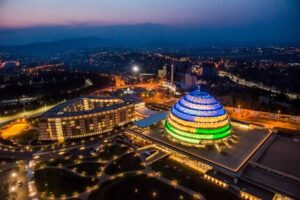
Rwanda-based IRCAD Africa has trained more 300 African surgeons in minimally invasive surgery, a government health official said as the African continent tries to address the great disparity between high and low income countries in the use of these high-tech surgical operations.
Rwanda inaugurated IRCAD (Institut de Recherche contre les Cancers de l’Appareil Digestif) Africa, the only centre on the continent that deals in research and training in an effort to help train Africa’s next generation of medical professionals in minimally invasive surgery.
Minimally invasive surgery is a modern medical technology that minimises pain and trauma on patients, allowing for shorter periods spent in hospital, a lower risk of bleeding and infection and a speedy recovery.
In Africa, many states still use traditional surgery that require long and painful operations and long periods of recovery, health officials said.

The centre’s managing director, David Kamanda told The Associated Press that it is a surgery area where high-tech instruments are used to do surgical operations.
“On the African continent, more than 95% of the population don’t have access to medical and surgical procedures. This is also one of the solutions we brought here in Rwanda, especially serving the African continent,” Kamanda said.
Kamanda also said the trained surgeons are coming from 25 countries on the continent and beyond, adding that the east African country was chosen to host because of its “global rankings, safety and internet connectivity.”
Founded in 1994, IRCAD – French for Institute for Research into Cancer of the Digestive System – has since become a world leader in advancing and teaching minimally invasive surgery (MIS).
It is expected that the introduction of MIS in low-and middle-income countries will reduce mortality associated with surgery in hospitals where there are poor health facilities.
IRCAD Africa is a branch of IRCAD France.
At the launch last year, Rwandan President Paul Kagame hailed the initiative and said it encourages them to “keep investing significantly in public health infrastructure.”
Dr Anel Lengton, a general surgeon in South Africa said IRCAD Africa is an invaluable tool the continent has acquired as it gives practitioners more access.
“We actually get to practice real-time on actual tissue. That is also something that we do not normally get trained with,” said Lengton.
Dr. Omeke Joseph Chigozie, a general surgeon from Nigeria, is at IRCAD for laparoscopic training, specifically the one known as hernias and colorectal surgeries.
“A lot of heroes are being developed here, a lot of legends are going to come out of this lab. And this is a welcome development not only for Rwanda, not only for Africa but for the whole world,” he said

